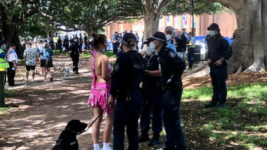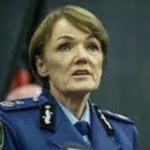Unlawful Strip Search Class Action Will Proceed, Despite NSW Government’s Attempt to Stop It

Right before the COVID pandemic shut down Sydney, NSW police use of strip searches was one of the state’s most prominent social justice issues, and coupled with drug dogs, these law enforcement tactics employed to find illicit drugs, are considered ineffective and to cause societal harms.
The lockdown, however, saw the streets devoid of people and events, like festivals, weren’t running, so the issue of strip searches was, for the most part, removed from the equation. Yet, as soon as opening up occurred, the police were back to their old tricks of ordering civilians to strip off.
So, the news that the Redfern Legal Centre and Slater and Gordon strip search class action will go ahead has been welcomed by those who consider the use of these procedures not only redundant, but their imposition on the public akin to the reality one might expect to find in a police state.
NSW Supreme Court Justice Peter Garling determined that the strip search class action could go ahead on 13 December, after the state of NSW had attempted to shut it down, as a group is set to challenge the legality of hundreds of strip searches carried out by the NSW Police Force.
And this attempt by the NSW government speaks volumes, as, for the past decade, police have been increasing strip search use, with hundreds of examples available of it being illegally applied in an often-traumatising manner, yet those on Macquarie Street appear to favour its continuance.
NSW police state
Raya Meredith lodged the class action statement of claim with the Supreme Court on 21 July 2022. And her complaint involves having been strip searched at Byron’s Splendour in the Grass festival in July 2018, after she was approached by an officer with a dog at the entrance.
The festivalgoer was then led to a 1.5-metre-high makeshift cubicle, and she lists a truckload of issues with her search, which was overseen by a female officer, including being told to pull her tampon out and to turn around and bend over, at which point a male officer entered briefly.
Meredith has further filed the claim on behalf of hundreds of other claimants as well, who are seeking damages over illegally applied strip searches during the period 2016 through to 2022.
Figures released by then NSW Greens MLC David Shoebridge in 2018, revealed that over the four years to June that year, NSW police strip search use had risen by 47 percent, with 3,735 searches carried out over the 12 months to June 2015, which rose to 5,483 over the year to June 2018.
NSW filed a notice of motion last January, outlining that while under section 157 of the Civil Procedure Act 2005 (NSW), seven or more can launch a class action in regard to “a substantial common question of law or fact”, it asserted there was no commonality between plaintiff claims.
But on 13 December, Justice Garling told the court that he was “abundantly satisfied that these representative proceedings should continue because they are the most effective and efficient means of determining the issues raised by the group proceedings”.
“Vague and legalistic”
Redfern Legal Centre has been calling out strip searches for years now. RLC senior police accountability solicitor Samantha Lee told Sydney Criminal Lawyers in 2019, that there’s a clear issue with strip search protocols set out in the legislation, as they’re “quite vague and legalistic”.
The most prominent powers applied by the NSW Police Force are contained in the Law Enforcement Powers and Responsibilities Act 2002 (NSW), which is commonly referred to as the LEPRA. And part 4 division 4 of the LEPRA sets out the laws governing strip search use.
Section 31 of the LEPRA makes clear that when carrying out a strip search in a place other than a police station, the seriousness and urgency of the circumstances must make it necessary for it to be undertaken straightaway. And this stipulation raises questions as to the legality of many searches.
Preservation of privacy and dignity during the search are the purpose that the provisions within section 32 are meant to achieve. And these include officers having to name themselves, to ask for the subject’s cooperation in searching them and to outline why the procedure is to take place.
An officer must not touch the genital area or breast area of women or transgender persons, unless it’s necessary. And a searching officer must be of the same sex as the suspect, questioning can’t take place during the search, and the subject must be allowed to put their clothes back on immediately.
Section 33 of the LEPRA outlines search rules, which include the search being done in a private area, that no person of the opposite sex is present and it must not be done in the view of anyone but the officers, while a parent, guardian or personal representative can be present during the procedure.
Further, searches of body cavities are forbidden, unnecessary clothes must not be removed, while the visual inspection of a person’s body should be prompt. And section 34 of the LEPRA maintains that no one under the age of 10 can be subjected to a strip search.
Over the last half decade, there has been complaints about strip search subjects being asked to lift testicles, part buttock cheeks, lift breasts, turn their body to face in a different direction and to squat and cough, as these orders are given by officers regularly, yet they don’t appear in the LEPRA.
However, in 2019, the NSW Police Force released its personal search manual, which happened to sanction all of these controversial search actions.
The watchdog inquiry
So, front and centre was this issue half a decade ago that the sole NSW police watch dog, the Law Enforcement Conduct Commission, announced it was investigating the NSW police use of strip searches, as it had received a “number of specific complaints and anecdotal information”.
The LECC produced a number of reports based on cases similar to Meredith’s, where officers took searches to extremes, bordering on abuse or assault. And the comprehensive final report of December 2020 contained 25 recommendations, and NSW police agreed with about half of them.
Yet, another common complaint about searches is that officers are prone to run a finger under the waistband, collar or sleeves of the search subject, which is clearly not sanctioned in the legislation and the LECC suggested it be brought to an end. However, the force denied that recommendation.
The skewed view from Macquarie Street
Strip searches have been publicly scrutinised of late, as the Redfern Legal Centre released figures in October that revealed over the 24 months to June 2023, police had strip searched 107 youths aged between 10 and 17 years old, including three girls aged twelve and six aged thirteen.
This was the first time that the strip search issue had garnered attention since the Labor government was voted into office last March. Yet, premier Chris Minns, doing his best version of a Coalition premier, defended NSW police strip search protocols, arguing that all the other states do the same.
And on the day following the release of the statistics, NSW Legalise Cannabis MLC Jeremy Buckingham raised an 18th October motion, calling on the state government “to ban child strip searches for suspected drug possession”.
While the Labor government made clear that police minister Yasmine Catley had determined to meet with stakeholders to ensure that police strip search policy is fit for purpose. Although since NSW Labor decided to undertake the inquiry, the minister is yet to raise the issue again.
But Catley’s decision to investigate does bring more promise than one of her predecessors did, when the issue took hold during his term in office.
Indeed, former Liberal MP David Elliott, when holding the position of NSW police minister in November 2019, stated that he has young children and if he “thought the police felt they were at risk of doing something wrong” he’d “want them strip searched.”







